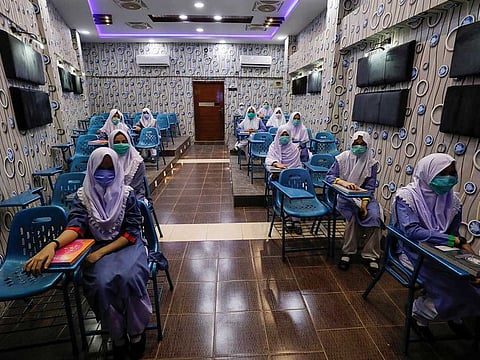COVID-19: In Pakistan, a tough year with no end
What if the coronavirus remains just as virulent in the fall as it is now? What then?

Pakistan’s education system has come to a grinding halt, and there is nothing that seems to work to get it going again smoothly. For the fourth time in the last one year educational institutions, from Prep to the Post-doctoral level, have suspended face-to-face teaching and instead have introduced online teaching.
The finals exams have also been delayed for a few months. The latest change in the teaching and learning field is different from the past instances primarily because the stakes are as high as frustration is rising among the parents who continue to pay the fees but see endless experiments costing their children huge learning losses.
So when last week the federal education ministry announced that they are delaying the exams yet again, there was mini mayhem on the social media and in the homes. The Cambridge A-level exams had already started — in fact one subject paper had already been held — and the O-level were about to begin.
‘No-compromise’ strategy
The local board and university exams were similarly in the line-up for completing a tough academic year. But it was not to be. On top of it, the government had promised that come hell or high water it will get the exams done. This had raised hopes and also engendered fears regarding the rewards and perils of this ‘no-compromise’ strategy.
Those in the majority were expecting the government to come good on its words; while those who saw this to be a dangerous strategy considering the rapidly growing coronavirus infections rolled their sleeves up to run a vigorous campaign against the decision.
The last week’s announcement that exams are being postponed has practically got the government the worst of both the worlds. The anti Exam-Now lobby was expecting the government to not postpone the exams but instead negotiate with Cambridge and with the local boards to accept school assessed grades and promote students to the next level.
This has not happened and now the entire burden of the studies has been shifted towards the end of the year term which on account of the winters is the shorter of the two teaching seasons. For Cambridge students a further nightmare is that the O-level students will be taking their final exams just when their next level of studies will also start.
Most A-level students desirous of pursuing foreign education have practically missed their full one year since the universities abroad base admissions on the exam results from June. They will now have to wait another year to apply for their studies.
Those who were ready to take their exams also feel being cheated out of their right to appear at their own risk. Their case did not evoke much attention from the government which was bent upon creating a non-exceptional policy.
For its part, the government has tried to soften the educational blow by asking the local universities to entertain admissions on “provisional” basis, to which most have agreed. It has also asked schools to allow A-level admissions to the final year O-level students as they take their postponed exams later this year.
Uncertainty prevails
For the A-level students who have to take their exams or miss applying for foreign university the proposed solution is “reduced number of students at different exam centers” under strict checking and supervision for Corona SOP enforcement. It is unclear how many will actually take the offer since the government on the other hand is also seriously contemplating a strict lock down.
For some strange reason that the government did not use a much simpler method to address part of the problem of holding the exams: Allowing the option of ‘yes’ or ‘no’ to every student.
The government could have given an honest assessment of the on-ground Corona situation to the parents and the students, leaving it to them to decide for themselves whether completing their academic career was worth taking the risk or not.
Exam halls could have been secured because after all they are not shopping markets where people rush, push and intermingle without any discipline. Even if half the students had decided to go for the exams this summer, the end of the year burden of unfinished and accumulated educational work would have been far less than what it would be now.
Also, there is no guarantee that coronavirus will disappear in four months’ time. What if the virus remains just a virulent in the fall as it is now? What will become of the exams then?
As of now no one is willing to tackle this frightening prospect. Holding exams and completing this academic year was a postponed problem that has been postponed yet again.
Syed Talat Hussain is a prominent Pakistani journalist and writer. Twitter: @TalatHussain12
Sign up for the Daily Briefing
Get the latest news and updates straight to your inbox







